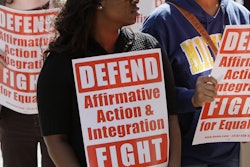President-elect Joe Biden chose Dr. Miguel Cardona, Connecticut’s first Latino education commissioner, to serve as U.S. Secretary of Education. While Cardona’s experience lies in the K-12 sphere, higher education experts are hopeful about what his selection might signal for higher education policy.
Announcing the nomination, Biden described Cardona as an “innovative leader” who would “eliminate long-standing inequities and close racial and socioeconomic opportunity gaps – and expand access to community colleges, training and public four-year colleges and universities to improve student success and grow a stronger, more prosperous and more inclusive middle class.”
Cardona began his career as an elementary school teacher in Meriden, Connecticut, the same public school system he attended. He then worked as a principal for ten years before becoming Meriden’s assistant superintendent for teaching and learning in 2013.
He graduated from Central Connecticut State University with his bachelor’s degree and attended the University of Connecticut, where he earned his master’s degree in bilingual/bicultural education and his education doctorate.
“For far too long, we’ve let college become inaccessible to too many Americans for reasons that have nothing to do with their aptitude or their aspirations and everything to do with cost burdens, and, unfortunately, an internalized culture of low expectations,” Cardona said in his nomination acceptance speech on Dec. 23.
Higher education policy experts hope he’ll focus on the needs of low-income and underrepresented students, as well as the institutions that serve them.
“I’m actually heartened by his background,” said Dr. Stella M. Flores, associate professor of higher education at New York University and director of access and equity at the Steinhardt Institute for Higher Education Policy. “I think he’s someone that has spent time trying to understand inequality, and I hope that he brings that language and that sense of duty to the job in a very vocal way.”














